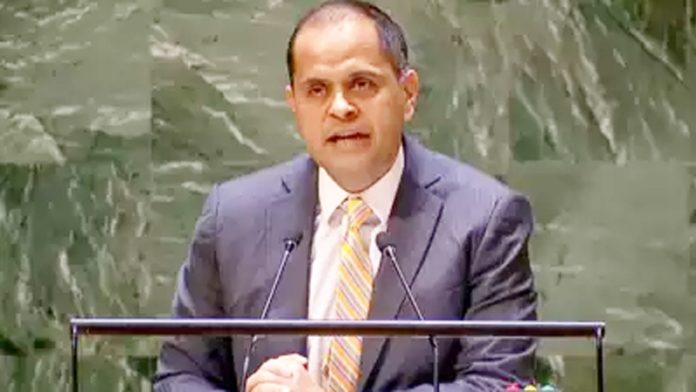UNITED NATIONS, Apr 26 : India has said that the revitalisation of the UN General Assembly must be seen in the wider context of the overall reform of the United Nations, including the Security Council, ensuring that it reflects the current geopolitical realities and can meet increasingly complex challenges.
“India has always been of the view that the General Assembly can be revitalised only when its position as the primary deliberative, policy-making and representative organ of the United Nations is respected in letter and spirit,” Minister at India’s Permanent Mission to the UN, Pratik Mathur said.
Addressing the Ad Hoc Working Group on the Revitalisation of the Work of the General Assembly on Thursday, Mathur said that the revitalisation of the 193-member General Assembly must also be seen in the wider context of the overall reform of the UN.
“It is our firm belief that the urgent and comprehensive UN reform, including of the Security Council, is imperative to make it reflective of current geopolitical realities and enhance its capability to meet increasingly complex challenges of our time,” he said.
The UN’s success rests on the effectiveness of the General Assembly in carrying out its role as its chief deliberative and policy-making body as envisaged in the UN Charter, Mathur said.
India gave a clarion call to make this reform of global governance architecture — that is fit for purpose for the 21st century — a reality in the ‘Pact of the Future’ that Member States are currently negotiating ahead of the Summit of the Future to be held in September, during the high-level UN General Assembly session.
Mathur said that with the proliferation of the agenda of the General Assembly, the Annual General Debate is gradually turning out to be one of the several high-level events that take place at the start of each new session of the General Assembly.
“The Annual General Debate has a special place in the annual agenda of the UN, and we should not let it be equated with various high-level events which do not enjoy the participation of all member states,” he said.
Mathur said that India believes that for the revitalisation of the General Assembly, the sanctity of the Annual General Debate and its associated elements must be restored.
He further noted that the essence of the General Assembly is in its intergovernmental nature.
“It is the closest thing to a global parliament. The success of multilateralism depends on the success and effectiveness of the General Assembly to address the growing number of challenges facing the world, which cut across national boundaries and regions,” he said.
India stressed that deliberations in the General Assembly should be inclusive, allowing every member state to participate equally.
“At the same time, the member states should engage in substantive deliberations in the six main committees that could result in setting new norms without being bogged down by procedural issues,” Mathur said.
Noting that the agenda of the General Assembly has expanded exponentially over the years, Mathur said it is important that the UNGA agenda is made more manageable so that the discussions become more informed and effective.
“However, any streamlining of the agenda of the General Assembly, including that of biennialization, triennialisation or elimination of agenda items, should be with the consent of the co-sponsoring State or States,” he said.
Mathur highlighted that the General Assembly revitalisation process has yielded fruitful results in recent years, improving how elections are held at the UN.
However, he said there is room for further improvement as elections in the UN body, which spread over multiple rounds, take several hours and become tedious.
“Modern technologies can help us save the precious time of the General Assembly,” he said.
Mathur said it would be useful to task the UN Secretariat to conduct a time-bound analysis of the current electoral practices, identify gaps and problems, explore other solutions, including technologically advanced electronic voting systems and recommend specific suggestions for improvements. (PTI)


